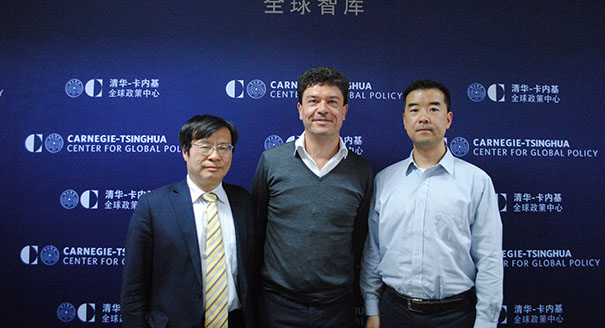Registration
You will receive an email confirming your registration.
Since its unveiling in 2013, the Belt and Road Initiative (BRI) has developed into a sweeping global project with profound implications for the international financial system, China’s own growth model, and governance in China and in countries along the Belt. The cornerstone of President Xi Jinping’s effort to reposition China as a global economic leader, the BRI has the potential to deepen international integration and alter financial standards and good governance practices.
Despite China’s promises of communal contributions and shared benefits, many in the West remain uncertain whether the BRI will reform or merely maintain preexisting norms and values. To what extent will the new China-backed financial institutions, the Asian Infrastructure Investment Bank and New Development Bank, compete with the traditional Bretton-Woods organizations? And how will the internationalization of China’s economy shape the nation’s domestic financial systems? Finally, how can China promote transparency and accountability within and beyond its borders as the BRI develops?
Carnegie–Tsinghua’s Shi Zhiqin moderated a discussion with Jean-François Huchet, vice-chancellor for international affairs and professor of economics at the National Institute for Oriental Languages and Civilizations in Paris, and Wang Xinsong, associate professor at the Beijing Normal University School of Social Development and Public Policy, on the BRI’s potential as an agent of change for international finance and governance, as well as China’s domestic development. This event was cosponsored by the Tsinghua University Sino-French Research Center.
This event was off the record.
DISCUSSION HIGHLIGHTS
- The Broader Impact of the BRI on China’s Domestic Economic Reform: The panel discussed the vast and multifaceted nature of the BRI and its potential influence on multiple sectors of China’s domestic economy. However, one discussant said that predictions of the BRI’s broad positive or negative impacts on China’s domestic reform process have been exaggerated. The panelist argued that, since the BRI is primarily a foreign policy tool to expand and create new trade and investment arrangements as alternatives to initiatives such as the Trans-Pacific Partnership (TPP) and Transatlantic Trade and Investment Partnership (TTIP), it will remain relatively peripheral to China’s domestic agenda.
- The BRI as a Tool for Postponing China’s Economic Restructuring: A panelist said that the BRI is currently limited in its ability to soak up overcapacity from China’s industrial sectors, suggesting that the project will not be a means by which China can postpone economic adaptations. Although Chinese contractors dominate China-funded projects along the BRI, the panelist said that even high projections for China’s investments in BRI countries are modest compared to domestic industrial investment, where overcapacity is fueled by small players protected by local governments. Furthermore, recipient countries of BRI infrastructure projects are increasingly calling for the use of local companies and capacities.
- The Beijing Consensus and the Bretton-Woods Institutions: A discussant said that the BRI will most likely facilitate domestic reform in China’s financial sector, particularly as the RMB is internationalized and domestic financial institutions provide more funding for Chinese-led development banks. Although Chinese-backed development banks are achieving greater prominence on the world stage, a panelist said that their global financial capabilities remain limited when compared to the Bretton-Woods institutions. Notably, the Asian Infrastructure Investment Bank and the New Development Bank are much smaller than the World Bank and International Monetary Fund respectively and are therefore unlikely to replace them in the mid or long-term.
- Advancing the BRI by Enhancing Local Governance: The discussants assessed China’s ability to manage the sweeping challenges of the BRI, particularly in the areas of financial capacity, risk assessment and control, and international criticisms and challenges from regional powers. To this end, a panelist advocated for China to focus more on the development of soft infrastructure throughout the project, such as institutions of policymaking, regulation and compliance. The discussant said that the pursuit of good governance practices carries numerous pragmatic benefits, not only in containing loan risks, attracting needed private investment, and managing sustainable development, but also in improving China’s global image and ability to work with international organizations.
Shi Zhiqin
Shi Zhiqin is a resident scholar at the Carnegie-Tsinghua Center for Global Policy, where he runs the China-EU Relations program and the China-NATO dialogue series.
Jean-François Huchet
Jean-François Huchet is vice-chancellor for research, director of the Centre for Asian Studies, and professor of economics at the National Institute for Oriental Languages and Civilizations in Paris.
Wang Xinsong
Wang Xinsong is an associate professor at the Beijing Normal University School of Social Development and Public Policy. His recent research focuses on the political risks of China’s overseas investments and their impact on the governance of developing countries.
